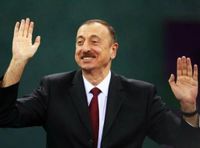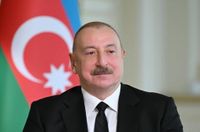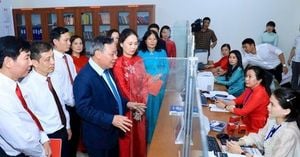The diplomatic landscape between Azerbaijan and Russia has shifted dramatically following Azerbaijan's refusal to participate in the Victory Parade in Moscow, marking the 80th anniversary of the end of World War II. This decision, made by Azerbaijani President Ilham Aliyev, has been interpreted as a significant political signal amidst a backdrop of changing alliances and regional dynamics.
On May 8, 2025, Russian President Vladimir Putin hosted a reception in the Kremlin, welcoming various foreign dignitaries, including Xi Jinping of China and Aleksandar Vučić of Serbia, to celebrate victory. However, notable by his absence was Aliyev, whose refusal to attend the parade has raised eyebrows and sparked discussions about Azerbaijan's foreign policy direction.
In a public statement made via social media, the Ukrainian Ambassador to Azerbaijan expressed gratitude to President Aliyev for his decision not to attend the Moscow event. The ambassador's post, which included stylized flags of Azerbaijan and Ukraine, signaled a strengthening of ties between the two nations, particularly as Azerbaijan has been actively supporting Ukraine in its conflict with Russia. Since April 2022, Azerbaijan has supplied the Ukrainian Armed Forces with aircraft bombs and, in the fall of the same year, transferred MiG-29 fighters to Ukraine. Additionally, Azerbaijan has been providing fuel to the Ukrainian military, indicating a strategic partnership that contrasts sharply with its historical ties to Russia.
Aliyev's absence from the Victory Parade is seen in Moscow not merely as a scheduling conflict but as a deliberate distancing from a shared historical narrative that has long united former Soviet states. The date of May 9 is particularly significant for Russia, symbolizing national pride and unity in the face of historical adversity. The refusal to participate is viewed as a clear indication of Azerbaijan's foreign policy realignment, moving away from Russia and towards closer ties with Turkey and other Turkic nations.
Following the conclusion of the Karabakh conflict, Azerbaijan has accelerated its pivot towards a new foreign policy architecture, with Turkey playing a pivotal role as a security guarantor and economic partner. This shift reflects a broader trend in which Azerbaijan appears to be embracing a more distinct identity, one that prioritizes integration with Turkic countries over its previous role as a bridge between East and West.
The implications of this shift are profound. For Russia, Aliyev's decision is a signal to reassess its influence and strategies in the region. The Kremlin has historically viewed Azerbaijan as a key partner, yet the recent developments suggest that Azerbaijan is now positioning itself as a more independent player on the geopolitical stage. The Azerbaijani government has been increasingly influenced by Turkey in various sectors, including humanitarian initiatives and media, while simultaneously reducing Russian presence in the country. This includes the winding down of operations by the Sputnik news agency and limitations on the activities of the Russian House in Baku.
As Azerbaijan distances itself from Russia, it is also embracing a narrative of 'multivectorism,' which is officially framed as a balance of interests. However, the evident strengthening of ties with Turkey and Turkic nations suggests a more pronounced shift towards this new alignment. Aliyev's decision not to participate in the Victory Parade is not merely a diplomatic snub; it represents a broader strategy of rejecting the historical ties that have bound Azerbaijan to Russia.
This evolving relationship has significant repercussions for regional stability and security. With Azerbaijan increasingly aligning with Turkey, the dynamics of power in the South Caucasus may be altered, leading to new alliances and potential conflicts. Observers note that while Azerbaijan seeks to assert its independence, the role of Turkey as a major player in this shift cannot be overstated. As Azerbaijan continues to strengthen its military and economic ties with Ukraine and Turkey, it remains to be seen how Russia will respond to this geopolitical reorientation.
In summary, Ilham Aliyev's refusal to attend the Victory Parade in Moscow serves as a crucial indicator of Azerbaijan's changing foreign policy landscape. The implications of this decision extend beyond mere attendance at a commemorative event; they reflect a significant rethinking of alliances and national identity in a rapidly evolving geopolitical context. As Azerbaijan forges ahead with its new strategic partnerships, the ripple effects will likely be felt across the region, prompting both Russia and Turkey to recalibrate their approaches to this pivotal nation.





